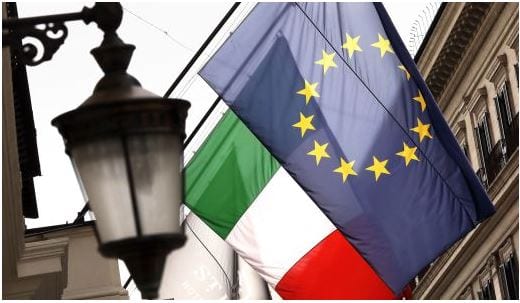Image by: Elisabetta A. Villa | Getty Images
Last month, Italy’s recently elected “eurosceptic” leaders have been threatened by the European Union’s Commissioner, Pierre Moscovici, to resubmit their 2019 budget plan to the EU in three weeks – or face fines. For all its attractions and successful firms, Italy is caught in a slow economic decline, requiring bold political leadership to push needed reforms (Moran, Abramson, Moran, 2014). Fast forward four years later and Italy may have the bold leaders it requires to pull the country out of said economic decline.
 From the date I started to write this entry, the revised budget plan was due to the EU within a week and my gut was telling me that Italian leaders were going to stand firmly behind what they believe to be the best course of action for Italy financially, and not fold under the recommendation of EU fiscal rules. If you have not come upon on this in the news, the budget plan is to increase the public deficit to 2.4 GDP, and the revisions to that initial plan were due to the EU Commissioner at midnight on November 13, 2018. The verdict: Italian leaders do not have plans to change what was submitted to the EU originally.
From the date I started to write this entry, the revised budget plan was due to the EU within a week and my gut was telling me that Italian leaders were going to stand firmly behind what they believe to be the best course of action for Italy financially, and not fold under the recommendation of EU fiscal rules. If you have not come upon on this in the news, the budget plan is to increase the public deficit to 2.4 GDP, and the revisions to that initial plan were due to the EU Commissioner at midnight on November 13, 2018. The verdict: Italian leaders do not have plans to change what was submitted to the EU originally.
Why does this matter? Well, Italy is the 8th largest economy of the world and ranked 3rd largest in national economy in the euro zone, and with 2.3 trillion euro national debt (133% debt to GDP), a euro zone bailout fund would not be able to cope with the costs of supporting its government in a crisis (Strupczewski, 2018). Any such crisis could threaten the euro itself, seen by many as the EU’s greatest achievement (Strupczewski, 2018).
The purpose of the European Union (EU) is to both preserve traditional and shared culture and foster the exchange of ideas between nations (Pennsylvania State University, 2018). Are Italian leaders willing to turn their backs on tradition and rules governed by the European Union? As stated by Moran, et al., Italians are frequently in a state of social, economic, and political change so to deliberately put forth a plan that goes against the rules of the EU may not be all that surprising to those who closely follow the country’s economic status (2014).
Speaking to reporters Thursday, Pierre Moscovici, a European Commissioner, said: “We would like Italy to remain what it is, a major country within the euro zone, there is no future for Italy outside the euro zone, there is no future for Europe without Italy.” (Amaro, 2018). The question stands, will either side budge? I predict a constructive dialogue that in the end allows them to keep the level of respect intact for the European Union rules as well as their 3rd largest in national economy in the euro zone, Italy. Whether Italy’s growth plan works or not, only time (and the markets response to the news) will tell.
References
Amaro, S. (2018). Italy has no future outside of the euro zone, top EU official warns. CNBC. Retrieved from https://www.cnbc.com/2018/11/08/european-commission-economic-forecasts-autumn-2018.html?recirc=taboolainternal
Economy of Italy. In Wikipedia, The Free Encyclopedia. Retrieved November 11, 2018 from https://en.wikipedia.org/wiki/Economy_of_Italy
Moran, R. T., Ph.D., Abramson, N. R., Ph.D., & Moran, S. V., MA. (2014). Managing cultural differences (Nineth ed.). New York, NY: Routledge.
Pennsylvania State University (2018). Leadership in Global Context–OLEAD 410. Differences within groups versus differences between groups. Retrieved from https://psu.instructure.com/courses/1942644/modules/items/24935363
Strupczewski, J. (2018). Reuters. ‘Complete insanity’ of Italy debt plans may lead to huge restructuring -euro officials. Retrieved from https://www.reuters.com/article/italy-budget-eurozone/complete-insanity-of-italy-debt-plans-may-lead-to-huge-restructuring-euro-officials-idUSL8N1WK2R6







